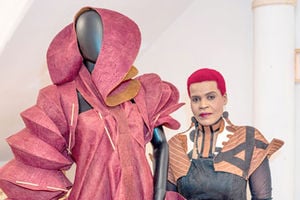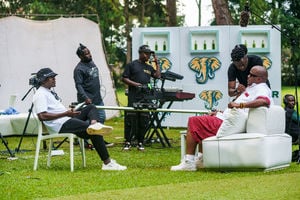
Edwin Nyaika
In recent years, the rise of social media has transformed content consumption habits, transcending its traditional role as mere entertainment. Today, content serves as a powerful tool for businesses and organisations to engage, influence, and communicate with their target audiences.
Edwin Nyaika has recognised the significance of this shift and has leveraged his skills to create impactful visual narratives that resonate with diverse audiences. Nyaika is a videographer and photographer who has gained a significant following on social media platforms due to his exceptional video content and storytelling photography.
In school when Teacher Viola asked her Primary Two students what they wanted to be when they grew up, Nyaika confidently declared that he wanted to become a computer wizard.
“While most of my classmates said they wanted to be lawyers or doctors, I wanted something to do with computers. It is probably because of the Sci-Fi movies I watched and the computers at home, which we used to do a lot of gaming,” he says.
Nyaika was at St. Francis Primary School, Ntinda, where where he completed his Primary Leaving Examinations before joining St. Lawrence Crown City for his O-Level and s St. Peter’s SS Naalya for his A-Level.
“I did HEG/Art in A-Level. I was very good at art and I was among the best three in my class. I went to school with Kwizera [a famous tweep] by the way, and we were taught by the same art teacher, whom I believe is the best artist in the country. I have not drawn in a while but if you give me a pen or pencil, I can draw.”
After high school, Nyaika enrolled for a Bachelor’s Degree in Information Technology Science at Uganda Christian University, Mbale campus. His father had wanted him to do Law, so he put law as first choice, fortunately, he was given IT, his second choice.
“I ended up at Mbale campus because of a minor mistake I made while applying. I went there painfully, determined to ask for a transfer the next academic year. Surprisingly, I ended up liking it in Mbale and I stayed for three years. The cost of living was quite cheap and the academic standard was pretty much the same because the lectures were the same,” he recalls.
After graduating, Nyaika, like many graduates, struggled to find a well-paying IT job. The job positions he encountered offered meagre salaries, most around Shs900,000 per month for entry-level roles. This did not make financial sense for the long haul, so he consistently turned them down. As Nyaika looked for employment, he started selling phones downtown.
“I was always looking out for phones with the best camera because I had gained interest in taking pictures. I used to buy my phones from downtown and because I used frequent the phone stores, I ended up making friends there who eventually trusted me to sell phones on their behalf,” Nyaika explains.
It might seem strange to turn down a job to sell phones, but Nyaika explains the logic behind his decision.
“In simple terms, it was more lucrative. For example, an iPhone 15 right now goes for about Shs5.5m. But when we buy them at wholesale price, we get it at about Shs3m and then sell it to the final user at the full price. So we would make a markup of about Shs1m or Shs500,000 from one phone in just a day. Compare that to an IT consultant who sits in an office all day and is waiting for Shs900,000 at the end of the month,” he says.
The beauty of this business, Nyaika explains, is that you do not necessarily need stock. You just need to know phone dealers and build relationships with them. When a customer tells you they need a phone, you can source it from the dealer offering the cheapest price, ensuring a markup when you resell it. In fact, Nyaika says there is even a term for people who operate this way – ‘bayilibi’.
“On a very bad day, I would earn about Shs200,000 and on a good day, I would earn Shs1m or more. Also, I think deep down I knew corporate life was not for me. I did not want a job that kept me on a desk for long hours. It is probably why I ended up pursuing a career in photography. ”
Getting into photography
While working part time as a phone dealer, Nyaika reconnected with his cousin, a medical student at the time who had a passion for photography.
“My cousin William would take pictures as a hobby. Over the weekend when he was free, he would do photo shoots for birthdays and baby showers. He had two cameras, so I started tagging along to help him. That is how I started and slowly I learnt from him.”
It is from this experience that he realised that professional photography could be quite lucrative. He saw William earn between Shs200,000 and Shs350,000 for a three-hour photoshoot and on a good weekend with two bookings, he would earn about Shs500,000 in just a week.
In 2018, Nyaika decided to fully commit to photography. He had not done any video work at the time and he never thought he would make it.
Along the way, he met Prosper Byamungu, the architect behind the Innovation Village space and at the official opening, Byamungu commissioned Nyaika to capture the essence of the space. As Nyaika frequented the Innovation Village to edit his work and network with fellow creatives, his talent caught the attention of management, landing him a full time job as a photography consultant.
“I was now a professional at that point, because I had done so many photoshoots. I like travelling and every time I went for a trip, I would take wildlife pictures as well, which also polished my skills,’ Nyaika shares.
When the iPhone 11 was launched, Nyaika bought it and he started experimenting with short city tour videos, which he shot while seated on a boda boda. He would then upload these on TikTok. These caught the attention of brands such as Safe Boda and Tubayo, leading to collaborations and further exposure.
Becoming a videographer
Fast forward to 2021. The economy reopens after the lockdown, Fireboy DML comes to Uganda. A concert, which would turn to be a pivotal moment in Nyaika’s career. Uganda Breweries was one of the sponsors for the concert and Nyaika, through a previous contact, Albert Katraguma from Pearl Guide, was fortunate to secure a gig to capture pictures for their experiential tent. At the time, Nyaika’s Instagram following hovered around a modest 3,000.
“At the concert, I was given a back stage pass so I could do my work comfortably. That is how I was able to get onto stage and record those videos, while Fireboy was performing. I had captured content for Uganda Breweries Limited (UBL) during the day, so I was free by the time Fireboy got onto stage,”
Nyaika captured a series of epic videos, including a particularly moving one of a fan overcome with emotion while singing along to Fireboy’s song. This clip, capturing the raw energy of the concert, went viral. Not only did it blow up on the internet, but Fireboy also downloaded it and shared it on his own page.
The Fireboy concert was not the only highlight of 2021. Nyaika continued to hustle, capturing captivating videos of other performers such as Adekunle Gold, aka AG Baby and the late Costa Titch. His TikTok audience soared to 20,000 followers, but his Instagram growth remained stagnant.
Desperate to grow his Instagram account, Nyaika decided to buy followers, who all disappeared a week after he had purchased them.
“When the first batch disappeared, I bought more from the same guy, only for them to disappear as well and this is when I realised the guy was a scammer, and I dropped that idea,” Nyaika narrates.
In the same year, Nyege Nyege provided another opportunity for Nyaika to shine. While working for UBL, he also captured his own content, which according to him, performed even better than his previous concert videos.
“I put out about 30 videos in total, and they all garnered at least 80,000 views or more,” he says, adding: “My strategy was to upload the content immediately, in real time so people would see the highlights first on my social media. That gave me a definite edge over other content creators.”
Buying his first camera
In 2021 Nyaika bought his first camera the Sony A7III. As opportunities expanded, he collaborated with Katraguma who had started his own experiential company. That marked the beginning of a fruitful journey. Soon, they were travelling together for international gigs across Africa, all expenses covered by their clients.
“When I started working with Albert, neither of us thought we would get gigs beyond Uganda,” he reflects. “I remember buying a chair for my home office with the money Albert paid me from his first event at Speak Resort Munyonyo. I still use my chair, a constant reminder of how far I have come.”
Nyaika also started working with DJs such as DJ Alisha, travelling with them on their international gigs. Another career highlight came when he created content for a Jameson hangout event. Several videos from that event garnered more than three million views on both TikTok and Instagram. Nyaika emphasises the importance of views.
“Views are crucial for account growth,” he explains, “as they translate into more followers. The bigger your account, the more credible you appear and that translates into business.”
“At that point, I was now full on Nyaika Studio as a brand I stayed true to myself and since I had taken this path, I was sure to excel at it. My Instagram account finally picked up and it is reaching 135,000 followers. The influencer gigs started rolling in as well. I became a sort of ambassador for brands such as Tusker Lite and Johnny Walker. These partnerships have exposed me to prominent influencers and celebrities, who have reached out to me for collaborations, ” Nyaika says.
Nyaika is now passionate about mentoring aspiring content creators.
Challenges
Nyaika highlights that the primary challenge he faces in his craft, is the high cost of equipment. According to him, a professional-grade camera body alone costs about $2000 (approximately Shs6.7m), while a set of quality lenses can add up to $2500 (about Shs9.5m). Additionally, essential camera accessories such as tripods, memory cards and gimbals can amount to $1000, bringing the total investment to around $5500 (about Shs30m).
“Cheaper equipment may seem like a more budget-friendly option, but it often compromises the quality of work. It is also important to have a good laptop to edit videos fast and effectively,” he advises.
Making it in content creation game
“Put your work out there such that people can see it, utilise your social media platforms as people will not see your work, if you keep it on the laptop or hard drives. Also, always make sure you deliver to your clients on time. If you promise your client that you will deliver the video tonight, make sure you do so, even if it means you staying up all night,” Nyaika advises.
He also says there is a lot of valuable information on the internet via platforms such as YouTube where content creators can learn and improve their skills. He advises content creators to keep themselves updated on industry trends and technological advancement.
Most importantly, Nyaika says, understand your equipment; after you have invested in good equipment, which matches your work, take time to understand how best to use it. Finally, Nyaika stresses the importance of professional presentation.
“Dress up appropriately, be smart. Try to fit in, depending on the occasion, if it is a wedding, show up looking like one of the guests, if it is a high end party, show up like you are one of them. Invest in your image.”

